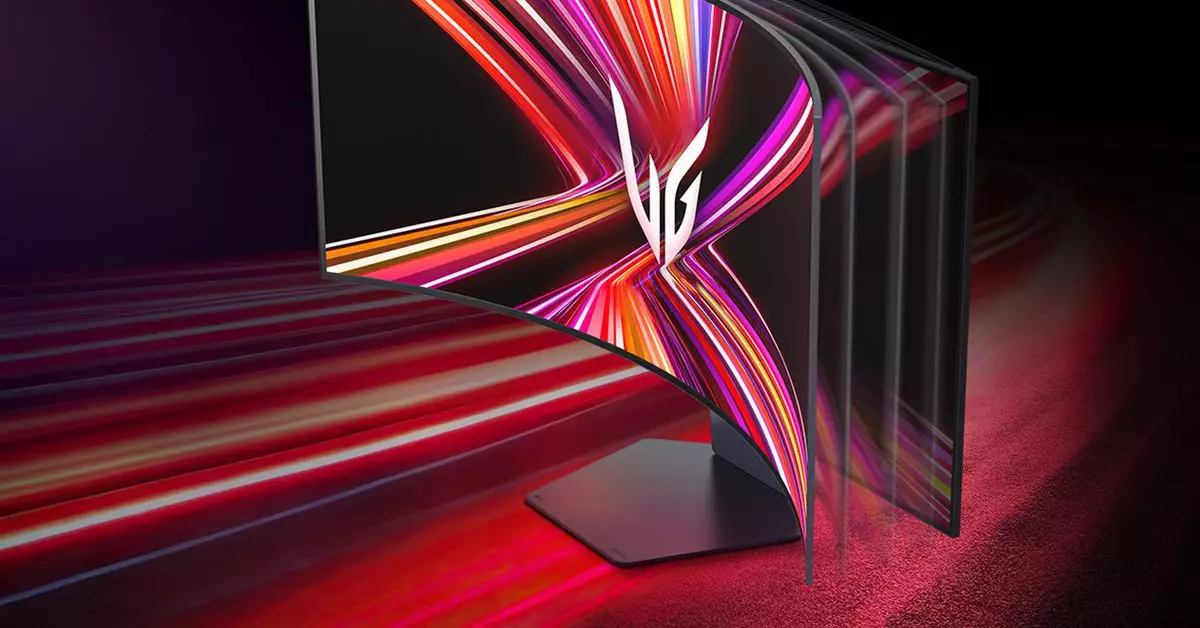As the landscape of gaming technology continues to evolve rapidly, LG is stepping ahead of the competition by announcing its 2025 range of gaming monitors well ahead of the CES trade show. A standout feature in this lineup is the UltraGear OLED Bendable Gaming Monitor, which LG boldly claims to be the world’s first 5K2K-resolution bendable OLED display. Such innovative technology inevitably warrants a closer examination, particularly as it aims to cater to a growing community of gaming enthusiasts who value both cutting-edge performance and immersive experiences.
At the heart of the UltraGear OLED Bendable Gaming Monitor (model 45GX990A) is a remarkable 45-inch display with a striking resolution of 5120×2160 pixels. This resolution offers an enhanced vertical pixel count akin to traditional 4K screens but expands the horizontal canvas markedly, resulting in a more sweeping view that can significantly elevate the gaming experience. The unique aspect ratio of 21:9 not only provides a more immersive experience than conventional 16:9 displays but also offers better compatibility with various content, surpassing the capabilities of 32:9 monitors.
With a curvature that ranges from completely flat to a pronounced 900R arching design, this monitor embodies versatility. Additionally, the Dual-Mode feature allows for seamless transitions between different resolution and refresh rate settings, tailoring the display to individual user preferences. Despite these impressive stats, it’s critical to note that the press release has yet to disclose a maximum refresh rate, an essential characteristic for gamers seeking high performance.
In tandem with the flagship bendable model, LG is introducing a non-bendable counterpart with a permanent 800R curve, carrying the same dimensions and resolution. This strategy allows users to select a model that best fits their preferences and workspace without sacrificing the superior visual quality for which LG OLED products are known. Claims of “sharp, lifelike images” and “stunning colors” reiterate LG’s commitment to maintaining high standards in display technology.
Shared specifications across the 45GX990A and the non-bendable model include an impressively low response time of 0.03ms (GtG), making it ideal for rapid-action gaming scenarios. Furthermore, support for cutting-edge connection standards including DisplayPort 2.1, HDMI 2.1, and USB-C with 90W power delivery ensures that these monitors are compatible with a range of devices, promoting flexibility and ease of use.
In addition to the flagship models, LG is also debuting the UltraGear 39GX90SA, a more compact alternative powered by webOS, programmed to function as a home entertainment hub. Designed with convenience in mind, this monitor not only boasts a compact 39-inch size but also maintains the attractive 21:9 aspect ratio with the practical 800R curve. Such design specifications make it particularly appealing for users looking to integrate streaming services into their gaming setups seamlessly.
Equipped with USB Type-C ports and an ergonomically designed L-shaped stand, the 39GX90SA aims to minimize desk clutter while maximizing functionality. By borrowing concepts from competitors like Samsung, LG is clearly positioning itself to appeal to a broader consumer base, consolidating both entertainment and gaming into a single coherent user experience.
While detailed pricing and release dates for LG’s 2025 gaming monitors are still pending, the upcoming showcase at CES will provide an opportunity for firsthand experience and critical evaluation. Early impressions will undoubtedly shape the market’s anticipation, especially in a year where monitors are set to feature prominently in a plethora of innovations unveiled at the event. For gamers and productivity users alike, LG’s commitment to high-quality visuals and flexible designs may just redefine expectations for gaming monitors moving forward. As we prepare for the displays to hit the market, the anticipation builds for what LG has in store as part of its wider vision for the future of gaming technology.


Leave a Reply